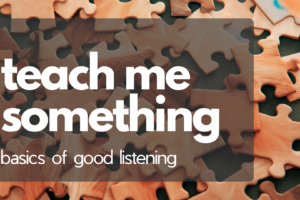I don’t know about you, but lately conflict has seemed like the loudest voice in the room. In this divided culture, people find themselves on extreme opposing sides of so many different issues— whether religious, political, or social. Finding common ground is becoming more and more challenging, and people are speaking their minds a bit too hastily and in ways that do more harm than good.
Disagreeing has automatically come to mean that we are enemies, but we have forgotten that it is normal for us to disagree. Even if we agree on 99% of every issue under the sun, there is still that 1%. People in the closest, most healthy relationships even disagree. It is normal because we are all uniquely created with differing personalities and opinions.
This lack of tolerance for disagreeing has infiltrated the church, too. And this is where it’s dangerous. The church calls for unity, but when did unity start being the same as uniform? Yes, it is vital for Christians to stand together on the main things that hold our faith together— that God is Father, Son, and Holy Spirit, that He created the world, and that Jesus came to this earth as a man, died for our sins, and rose again, defeating death. This is absolute.
But the reality is that there are and always will be many things on which Christians will disagree. And that’s okay. When done well, it can even be healthy for the church and for relationships.
However, more often than not, it is not done well. People attack one another if they say anything that could indicate the other falls on a side of an issue that the church has not traditionally supported. Instead of demonstrating loving-kindness, people react in anger and bitterness and even hatefulness. Of all people, the church should be able to disagree well as a way to love one another, but also to model it for the world. So how can we disagree with each other in love?
1. Be the best listener in the room.
We should strive to outdo one another in listening well. Instead of always feeling like we need to get the last word or share our opinions and thoughts about something, we can be the ones who listen well. We need to be “quick to listen, slow to speak, and slow to become angry” (James 1:19). If we feel a need to interrupt, we can hold our tongue and be patient in the moment. We need to pay attention to others and their points of view that matter just as much as ours do. We do not have to agree with what they are saying, but we can listen with empathy and understanding. If we don’t understand, when they are finished speaking, we can ask some clarifying questions. Again, be the best listener in the room.
2. Check your heart.
If you disagree with someone on an issue and you want to share your own opinion on the matter, it is important first to check your heart. What is your motivation behind sharing this? Is it to be right? To prove a point? To put another in their place? Is your motivation pure in sharing your own thoughts and beliefs? If it’s not, maybe it isn’t the right time to share.
3. Disagree with kindness and grace.
Listen, humans are all created uniquely different. That means that people will inevitably disagree about something. It could be a big or small issue, but it will happen. If you have listened well and considered your motives to be pure, then you can share your thoughts if appropriate. When you share, be careful not to attack the other person or their point of view. Keep your thoughts centered on what you think and believe and why. Work to be respectful in your tone and the words you use, and you can even say something like, “I can understand why you’d feel that way,” or “Your opinion on that makes sense,” or simply, “I hear you.” These phrases can go a long way and help the other feel heard and loved.
We can always go back to the Golden Rule here, to treat others how we want to be treated. If we want our voice heard, the we need to be willing to let others’ voices be heard too. If we want to be treated with empathy and respect, then we need to extend the same to others too. Disagreeing can divide or it can bring a diversity of voices to the table in unity. Disagreeing is not a bad thing if we learn how to do it well. We have the choice.





Recent Comments